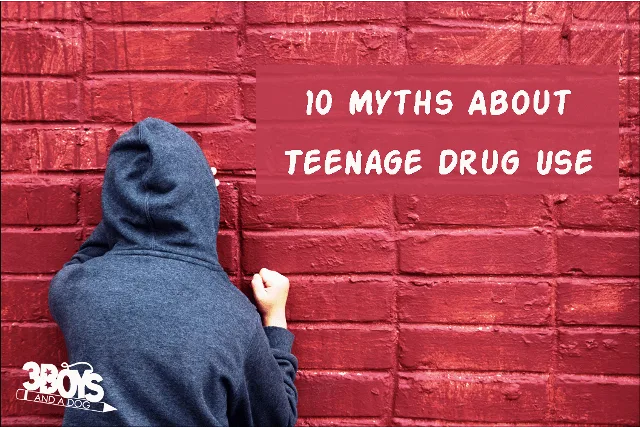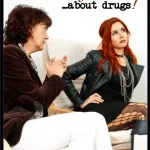This is a sponsored post written by me on behalf of National Institute on Drug Abuse for IZEA. All opinions are 100% mine.
From January 25-31, 2016, the 2016 edition of National Drug & Alcohol Facts Week (NDAFW) will be held. Every year, this observance focuses on helping teens to get the facts and SHATTER THE MYTHS that surround the abuse of drugs.
NDAFW, which is sponsored by the National Institute on Drug Abuse (NIDA) and the National Institute on Alcohol Abuse and Alcoholism (NIAAA) was established to help teenagers and their parents learn the truth about alcohol and drugs, especially since popular media often depicts the use of these substances as “adult” and “consequence-free.”
Since National Drug & Alcohol Facts WeekSM was founded in 2010, it’s grown to become an international event featuring scientists and addiction experts, where teens can talk openly about drugs without judgment or fear. This year, NDAFW is offering plenty of resources for parents who want to start a dialogue with their teens about drug use in their communities. Learn these 10 must-know myths about teenage drug use and get the facts to help you and your teens SHATTER THE MYTHS together!

10 Must-Know Myths about Teenage Drug Use
Myth: You won’t die from taking meth. Fact: Methamphetamine use can kill you. Health risks associated with meth include stroke, elevated body temperature, and heart attack.
Myth: You can’t get addicted to marijuana. Fact: Marijuana is an addictive substance. In fact, NIDA reports that teens who begin using marijuana before the age of 18 are four to seven times more likely to develop an addiction to it later in life.
Myth: Chewing tobacco is safer than smoking cigarettes. Fact: The body absorbs nicotine much faster through chewing tobacco than through cigarettes.
Myth: Drinking cough syrup for recreation isn’t really dangerous. Fact: Abuse of cough and cold syrup can be fatal, particularly when these medicines are mixed with alcohol.
Myth: Street heroin is “pure”. Fact: Heroin purchased on the street usually contains several substances, including some that are toxic.
Myth: Taking ecstasy will make you feel happier. Fact: While some ecstasy users have reported an increased feeling of love and empathy, others have experienced negative effects such as agitation, anxiety, and depression.
Myth: E-cigarettes are safer than tobacco. Fact: The vapor of some e-cigarettes has been found to contain known carcinogens (substances that cause cancer).
Myth: Teens are more likely to try “crack” than cocaine. Fact: According to NIDA, 12th graders are more than twice as likely to try cocaine than crack.
Myth: Prescription drugs aren’t really “drugs”. Fact: Prescription drugs are dangerous substances, especially if they are taken for recreational purposes. Taking a prescription drug that does not belong to you is considered drug abuse.
Myth: Taking anabolic steroids will make your body stronger. Fact: Use of anabolic steroids can cause your body to stop growing, especially if teens begin using it during puberty. Anabolic steroids have also caused severe acne, high blood pressure, and an increased risk of cancer in some teens.

How to Talk to Your Teen about Drugs
Talking about drug and alcohol facts with teens can be tricky. Some teens may withdraw whenever you try to broach the subject with them. Others may feel embarrassed or ashamed to talk honestly about their feelings on the drug issue. The National Institute on Drug Abuse has provided several resources that can help parents talk about this important subject with their teenagers. For example, the National Drug & Alcohol IQ Challenge is an awesome tool for testing both parents’ and kids’ knowledge about drug use.

Personally, I found taking the IQ Challenge to be tremendously helpful in starting a dialogue with my child. Turns out we both have a lot to learn about the drugs that pose a danger in our community. The Family Checkup is another NIDA resource that can help us as parents to establish an open relationship with our teens, even when we have to talk about the pressure to try drugs. Be prepared, though. The questions and suggestions in the Family Checkup are pretty blunt and they can really make us reexamine our approach as parents. But that’s a great thing! We want to make sure we’re prepared to handle any situation, especially one that can threaten the safety of our kids. If you find that your teen has a problem with drugs, NIDA has resources that can help. There are warning signs, tips, and encouragement to help parents find treatment, make decisions, and provide help to their teens. How have you helped your teenager to get the facts about drug use? Please share your experiences in the comments!



Christina
Wednesday 11th of January 2017
You make a good point about how seriously people should take recreational drug use when it comes to prescription drugs. These can definitely be problematic, as you suggest.
Paul Greer
Thursday 18th of August 2016
Great post Kelli! drug awareness is a necessity for people nowadays, especially for teens,
Rachel
Tuesday 2nd of February 2016
Hey Selena,
This is a very big topic. Those myths, I was surprised that drugs are taken so lightly. That individuals feel they can't die from them. But when I think back to when I was younger at the experimental stage of my life, I heard about all the good these drugs did. I was eager to try them all. As my experience grew the come down was horrible. Depressed for a full day even longer, paranoid, anxious. And meth was not even around at the time. I find it the scariest drug on the market.
There is so much choice, peer group pressure, hormones, teenagers wanting their independence. Its a trying time. What I have heard in the past - the words of hindsight. Parents saw the signs but put it down to others things (when you have no experience with drugs and what a person becomes how are parents supposed to know until addiction is upon a child) - its a busy time as a teenager. Those lines of communication between child and parent are so important. Glad there are awareness weeks where information and drugs are discussed.
Rachel
Jessica Simms
Sunday 31st of January 2016
Thank you for sorting out these facts, it's crazy how many myths there are that many take at face value.
Krystal
Sunday 31st of January 2016
It is important to have awareness about these kinds of issues. I am just now seeing all the e-cigarette warnings out and about.